PyReach
-
@Faraday @somasatori But we are all former gifted kids, we have to pick things up immediately or we can never actually be good at it?!?
(edit: this is a joke)
-
-
-
@somasatori said in PyReach:
I was kind of wondering when you or MisterBoring would notice Mummy in the screenshots I’ve been posting.
There are two editions of Mummy, so where is legacy_mummy?

-
@Jennkryst said in PyReach:
@Faraday @somasatori But we are all former gifted kids, we have to pick things up immediately or we can never actually be good at it?!?
(edit: this is a joke)
@Pavel or I can talk to you about this at a very low hourly rate!
-
@somasatori said in PyReach:
@Jennkryst said in PyReach:
@Faraday @somasatori But we are all former gifted kids, we have to pick things up immediately or we can never actually be good at it?!?
(edit: this is a joke)
@Pavel or I can talk to you about this at a very low hourly rate!
Thou shalt have no relationship other than clinicial, if thou forake this commandment thou shalt lose thine license.
-
This entire thread (about the programming bits) is making me want to make Evennia utility modules you can just plug in (e.g., basic dice rollers, generic scheduler stuff), but I’m so out of the loop on things now and I don’t have time in the day to do this. ;.;
-
@dvoraen Evennia is missing a lot of shockingly basic stuff. TOO BAD YOU CAN’T.
-
For real, @Tez is right and a lot of very simple things we take for granted in Rhost/Ares/Tiny/Penn is not included in base Evennia. Mail, for example, is handled via contrib file, page is a custom thing, etc.
-
@somasatori said in PyReach:
For real, @Tez is right and a lot of very simple things we take for granted in Rhost/Ares/Tiny/Penn is not included in base Evennia. Mail, for example, is handled via contrib file, page is a custom thing, etc.
That’s true, but I will say that same lack of built-in features offers tremendous flexibility, and is why I steer folks to Evennia for super custom projects.
When you come into things with the pre-baked idea of what a MU should have, as Ares and (to a lesser extent) the Penn/Rhost/Tiny family, it makes it difficult to depart from those paradigms. Just think of all the drama caused by built-in commands vs +commands over the years.
Everything being a plugin/contrib isn’t necessarily bad, because it can lead to developers who focus on making a really good (insert system here). Just think of how Myrddin’s BBS or Anomaly’s jobs or Theno’s WoD were de-facto standards in Penn/Tiny even though they weren’t baked in.
In the early Ares designs, everything was intended to be a plugin to offer that same degree of flexibility. But I quickly realized that there are a LOT of dependencies across systems. Far more than I anticipated. To make everything work together seamlessly out of the box, which is Ares’ main “selling” point, the code has to be very “opinionated” about how things should be done.
Everything is a tradeoff.
-
I think I’m moreso surprised that Evennia hasn’t seen a community collection of solid tools for very common use cases, the way we often saw on MUSH and MUX back in the day. Not that Evennia should be shipping with it, but that it sounds like there hasn’t been much collection of community-built plugins of sorts.
-
I think I’m moreso surprised that Evennia hasn’t seen a community collection of solid tools for very common use cases, the way we often saw on MUSH and MUX back in the day. Not that Evennia should be shipping with it, but that it sounds like there hasn’t been much collection of community-built plugins of sorts.
I think the only reason it hasn’t is because everything is custom. You can’t guarantee that the game that will get your code has written their command file to include the command needed to access the file you put the code in, and you can’t guarantee that they have edited the player-bit file to even be able to use the command in the first place.
… or I am seriously misremembering how Evennia code works.
-
@Jennkryst said in PyReach:
I think the only reason it hasn’t is because everything is custom. You can’t guarantee that the game that will get your code has written their command file to include the command needed to access the file you put the code in, and you can’t guarantee that they have edited the player-bit file to even be able to use the command in the first place.
… or I am seriously misremembering how Evennia code works.
Any command that you want to have accessible on the game has to be accounted for in the default_commandsets.py file under either the character level or account level. But you’re probably already going to be doing this, tbh, if you want to add in the contrib plugins like mail, so it wouldn’t be a huge ask to throw in your other contribs. It looks like this with the mail file:

then just do
self.add(mail.CmdMail())under the account level commands and bob’s your uncle. It also wouldn’t be hard to do something like …
from contrib.game_systems import dvoraen_commsthen
self.add(dvoraen_comms.CmdPage())From the game runner’s perspective that’s all you have to do. You could potentially get a command suite for Evennia and function call it all there, or like how Melteth set up his BBS commands on Dies Irae: create a command set that you’re calling from the default_cmdset.py so you don’t have to require the game runner to apply each different command individually. This is how that looks for Melteth’s BBS:
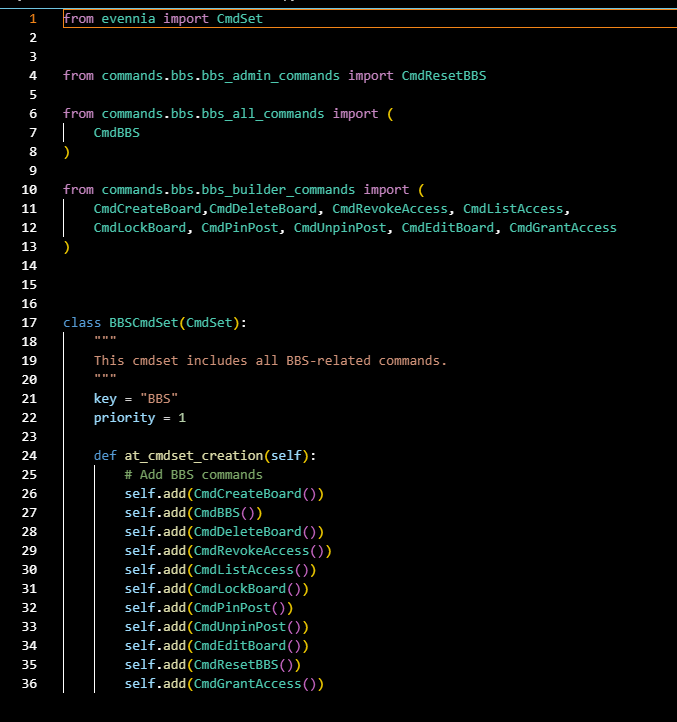
So! From the game runner’s perspective, that is, the perspective of the person who’s trying to boot up a new MUSH, all you do is either git pull the BBS commands or download the code file and apply it to your evennia installation manually (gross), and then all you have to do is reference the commandset in your default_cmdset.py file, like so:
from .bbs.bbs_cmdset import BBSCmdSet
then on Dies Irae I put this under the character-level commands:

I would say that this is as much labor as it would be to copy/paste SGP into your client after setting up room #2 when you’re attempting to configure rhost or tiny/penn. IMO, anyway. It’s about as much typing.Edit: also, one of the reasons I like evennia aside from being familiar with Python is due to how configurable it is like Faraday was mentioning. You can really get a lot out of it if you want to.
-
AS AN ASIDE. Melteth jobs and BBS are fine pieces of code and I think are still stored on the public facing Dies Irae github repo for anyone looking for code snippets that could work for their new Evennia game. If they’re not stored publicly, obviously I’m not going to hand it out since it’s not mine and would be up to Melteth@DI, but if it is, they’re great contribs. Anyhow, they shouldn’t require any Dies Irae dependencies as they’re designed to function separate from the rest of the command and world/DB structure.
-
I think the difficulty of all of these basic pieces likely holds it back from wider adoption. There’s a reason there’s 10 new ares games for every new evennia game. ANYWAY GOOD LUCK WITH THIS.
-
Hello, I’ve been working on more sheet stuff. Most of the time I’ve been spending with this has been on data entry, but I was able to play around with the sheet output and also refactoring some of the methods to call from the template files rather than be inline within the command files.
Here’s the main sheet for a mage:
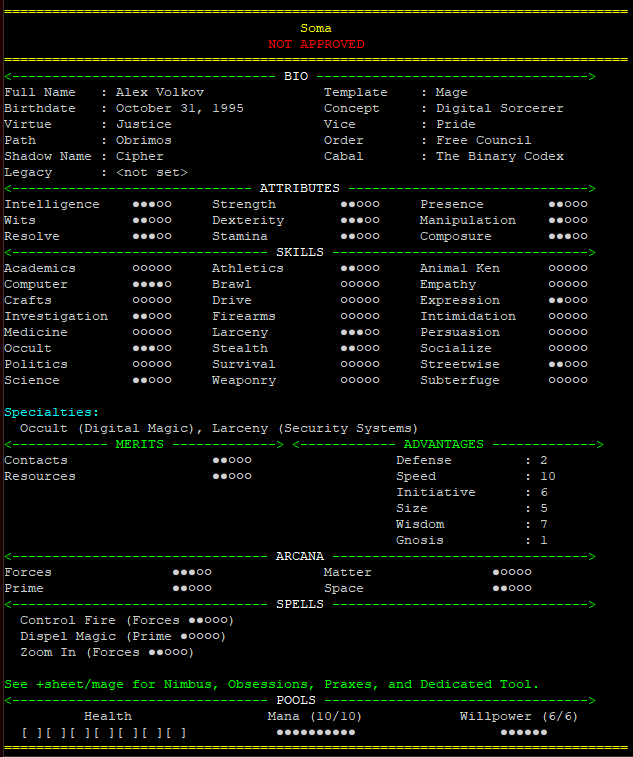
Mage sheets now have this second section to store all of the Mage-specific data (accessible through +sheet/mage):
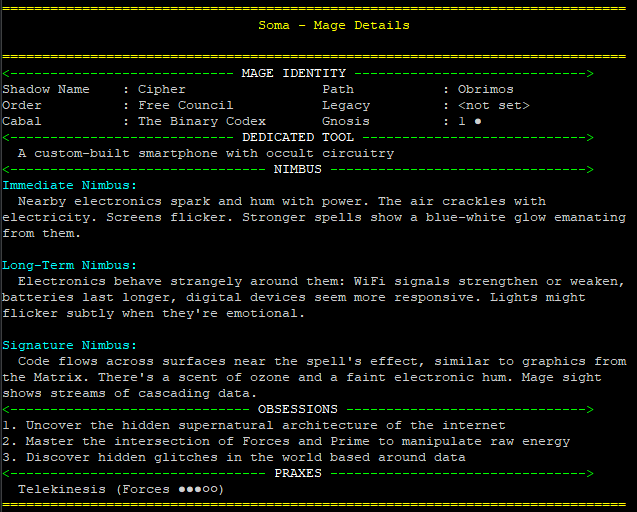
Sin-Eaters similarly have a special section for their Geist. This is only for the 2nd edition CofD Sin-Eaters (default):
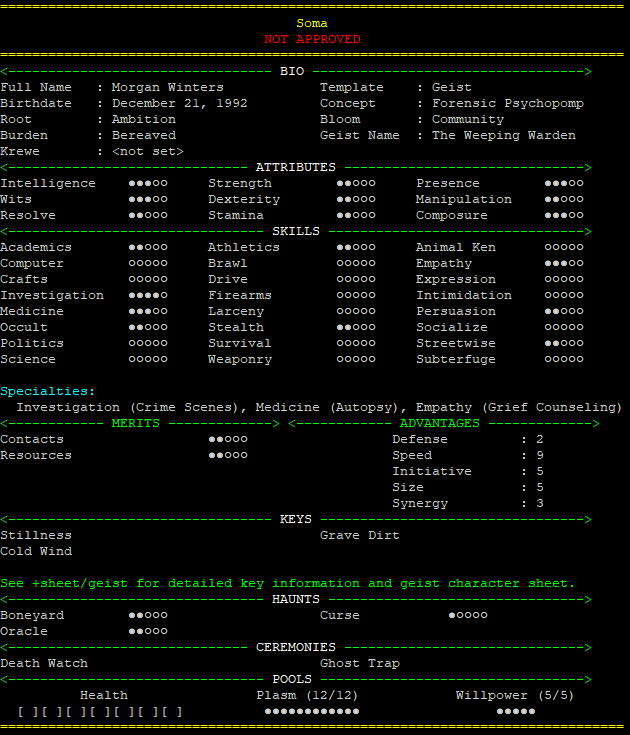
I’m not sold on the color but eh, I wanted to give it a kind of gravitas and make it distinct from the regular character sheet. Compared to the Mage specific stuff above, I think the +sheet/mage bit looks a little cleaner. Anyhow, this is +sheet/geist
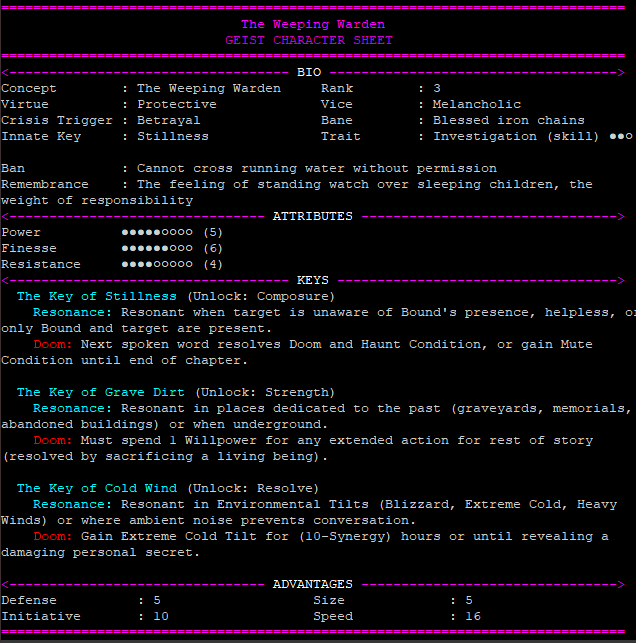
-
@somasatori Keep this up and people are going to expect you to start a game.

-
Basically everything I’ve been doing lately has been in support of the sheet. I’ve reached a fairly comfortable place when it comes to data entry and displaying that to players. I’m not great with the Evennia web stuff, so I’m trying to make sure there are utilities available within the client to view details. I might try to dive in to look at how to display these on the web. Theoretically it shouldn’t be reinventing the wheel since I’m just using python dicts. All of our data entry on Dies Irae was based around loading JSON files which ended up being fairly easy to incorporate into Django. I am fairly sure that’s why Kumakun decided on that route.
I reworked the +info from Dies Irae a little bit and have it displaying the data directly from the dictionaries. It seems to work… better than when we were importing from JSON? Cautiously? One of the big plus sides of nWoD/CofD is that there are fewer stats and, more importantly, fewer stats that are called exactly the same name. The big ones I’ve run into so far have been Mage spells having similar names to merits, but that’s easy enough to work around.
Some examples:
+lookup (the new +info) on its own:
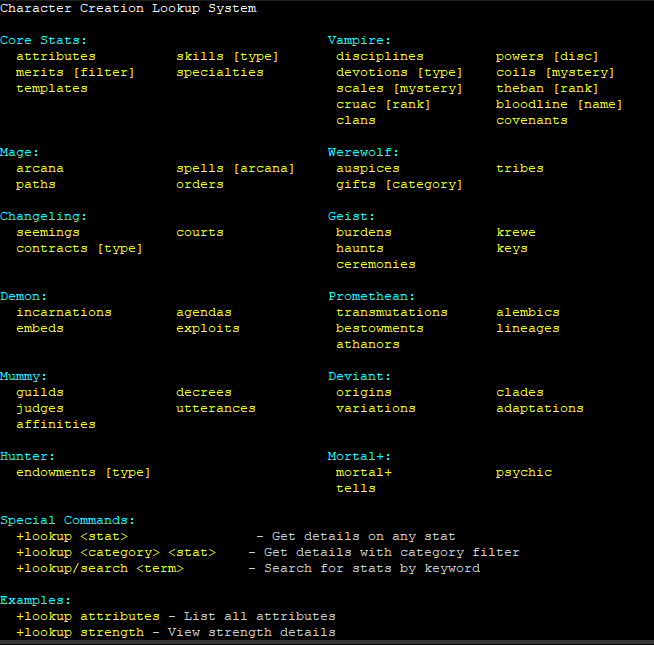
Let’s look at Forces spells:
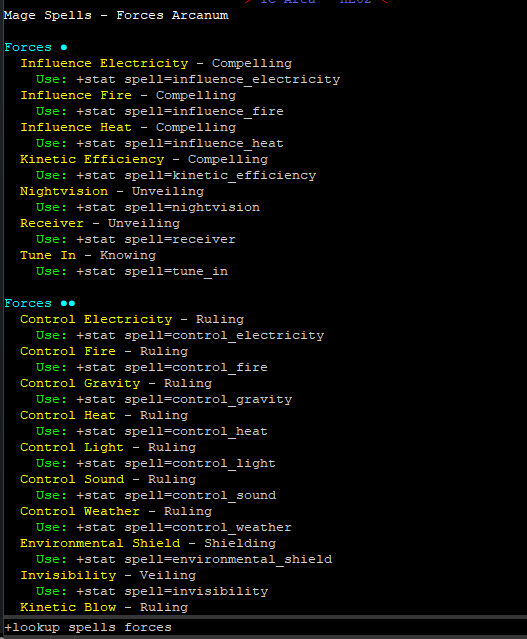
Let’s take a look at Control Heat:

Now let’s take a look at some Vampire powers. Let’s check out Animalism:
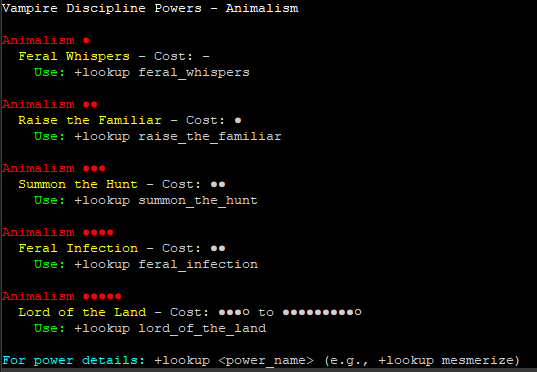
Let’s see what Summon the Hunt does and requires:

As an aside, the bottom is wrong. In this case I’m broadly using the lookup output method I use for Rites/Ceremonies/Gifts/Contracts/etc. for leveled powers like Disciplines. Animalism is tracked by using +stat animalism=<value>. If you wanted this specific power, you would do +stat animalism=3, or +xp/spend Animalism (three times). Then you would have Animalism 3, or the first through third level abilities.
So largely I took the information on Codex of Darkness to quickly fill this out. I’ve gone back through to verify that everything looks copacetic with regards to their book entries.
Oh yeah! I also took the “generic” commands from Dies Irae and put them into a folder. I also stripped out some of the overcomplicated bits from them that often caused them to fail miserably. For instance, I removed any web-based workflow from +finger so that it solely interacts with elements on the character db object. I wrote up a readme file explaining what to remove if you didn’t plan on using the PyReach/CofD system. There are only a handful of commands that rely on other things, most notably the say/emit/pose system and languages. In Dies Irae, and inherited into PyReach, you could speak a different language in poses and emits by using the tilde (~) key. You could, for instance, write out something like…
@emit Listening to John, Soma gives a short, curt nod and responds, “That all sounds workable.” They turn to Sam and say ~Where are we with the plans for tomorrow night on your side?
If I had my language set to Arabic, the text after the tilde and before terminating punctuation (question marks, periods, exclamation points) would display to anyone who also had Arabic set as one of the known languages, otherwise would show a general “something you don’t understand” message if someone did not have that language. This way you could flip back and forth out of the language by alternating between ~ and standard quotation marks.
If you’re not planning to use the language system – for example, if you aren’t using the
characters.pytypeclass in PyReach – then there’s a small section in the pose/say/emit commands that you need to comment out, which I explain in the readme. I’m going to have another Evennia developer dummy test this to verify that it all looks okay – a lot of this stuff is Dies Irae code which was worked on a lot, but could be questionable at times – and hopefully would be a good, easy-to-implement command set for people who might be nervous about Evennia due to familiarity with Tiny/Penn. -
@somasatori So when is the soft launch and what California city is it set in?
-
@MisterBoring said in PyReach:
@somasatori So when is the soft launch and what California city is it set in?
Whyfor California, when Miami is right there?







